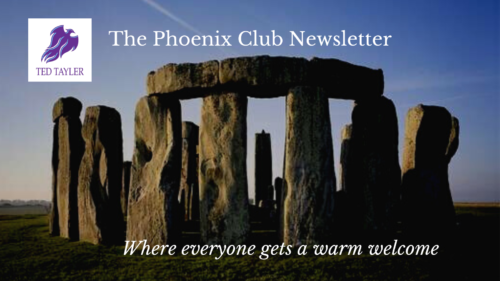Skip to contentMany years ago I learned the lyrics of the song – ‘You Never Can Tell’.
Chuck Berry had a way with words that was so different from the standard pop song lyrics. They were complicated, and a devil to learn. That seems to sum up everything facing me at present. You never can tell what will happen next.

You can’t stand still in this game. Even when you believe you have all your ducks in a row there’s a new gimmick that other authors are trying, or a tried-and-trusted system is no longer available. When I see an opening in the schedule for getting to grips with that next book something crops up that demands my immediate attention.
Last month I mentioned the online course I took in search of readers willing to devour every book in my back catalogue. Yes, it proved useful in setting up a series of Amazon Sponsored Ads, and as predicted by experts I’d contacted during 2023, progress is slow, and success isn’t guaranteed. But, something’s working, because Sales are 50% up on last year.
However, the course also suggested several other things could be preventing books from selling in larger numbers – the covers, the ‘blurb’ or the book synopsis, and the ‘brand’; that buzzword which defines whether a product page convinces a customer to make the all-important click.
With fifty covers to replace, the cost would make my eyes water, so I quickly moved to the last item on the list.


What could I do about the brand? Well, the result has been a complete overhaul of both series. I studied how other writers in the same genre presented their A+ Content and designed a range of images to better present The Phoenix and Gus Freeman. I’m happy with the results, and time will tell whether they complement the work of the Amazon Ads.
My next task will be to upgrade my blurbs. How do I condense a 65000 word book into 150-250 words?
The course organisers offered to re-work one of my blurbs which could supercharge performance. That might help the debut novelist but getting them to re-work another forty-nine blurbs would wipe out my Royalties for a whole year. So, that wasn’t an option. I decided to follow the four basic elements to writing a blurb which they highlighted.
A Headline or Hook grabs the attention, and encourages the potential customer to continue reading. Then comes the synopsis (NOT a plot summary) where the book’s main conflict is identified at the top of the paragraph. What defines the main characters? What emotions are in play? The synopsis phase should build the positive energy throughout until the selling paragraph which explains why the potential customer MUST buy this book. A call-to-action might not be necessary if all the other boxes have been ticked, but it won’t hurt to give a final nudge to click the buy button.
So, I have my work cut out. Or maybe not? That formula was the one I used in my early books, and continued using until last October. A polished version of those original blurbs could prove more beneficial than the format inspired by checking out the blurbs of my Also-Boughts. Check out my progress over the coming month.
Finally, the modest subtitle. That box on Amazon KDP where, for almost a decade, writers named the series from which the title came, and its position in that series. The growth of the ‘gripping, unputdownable, pulse-pounding crime thriller with jaw-dropping twists’ continues unchecked. I can’t stand them, so, I asked my readers whether a hyped subtitle has ever persuaded them to buy a book. Here are a selection of their answers that are still arriving in my Inbox.
“I only need a few words, telling me what kind of book it is. I don’t need to know if someone else couldn’t put it down etc. That doesn’t mean it will have the same effect on me. The blurb – a concise summing up of the subject matter will influence me more than anything.”
“A hyped-up subtitle not only doesn’t have any positive impact on me, but it can also have the opposite effect. These subtitles are now so common, so much the same and lacking in imagination that they come across to me as lazy and desperate.”
“If an author is on your preferred list, all that is needed to sell the book is your experience of that writer’s past work and your enjoyment of it. If you are considering an author new to you, the most important initial eye-catchers are the cover, title, and an alluring blurb; Hype means nothing as far as I am concerned.”
“Nope, a hyped subtitle has never worked for me. I decide on it if the synopsis sounds good. If the first book is as good as it sounds, then the whole series is great reading too.”
I’ll be back in April with an update on my progress, and I hope to bring news of an exciting development.
Best wishes
Ted Tayler



